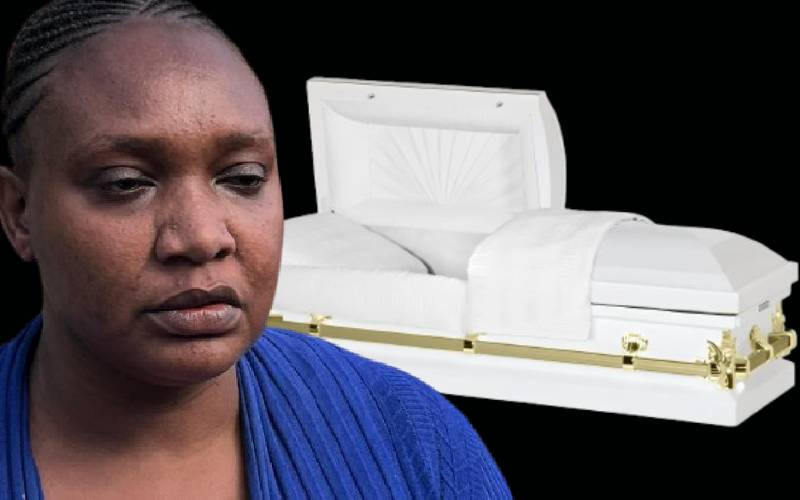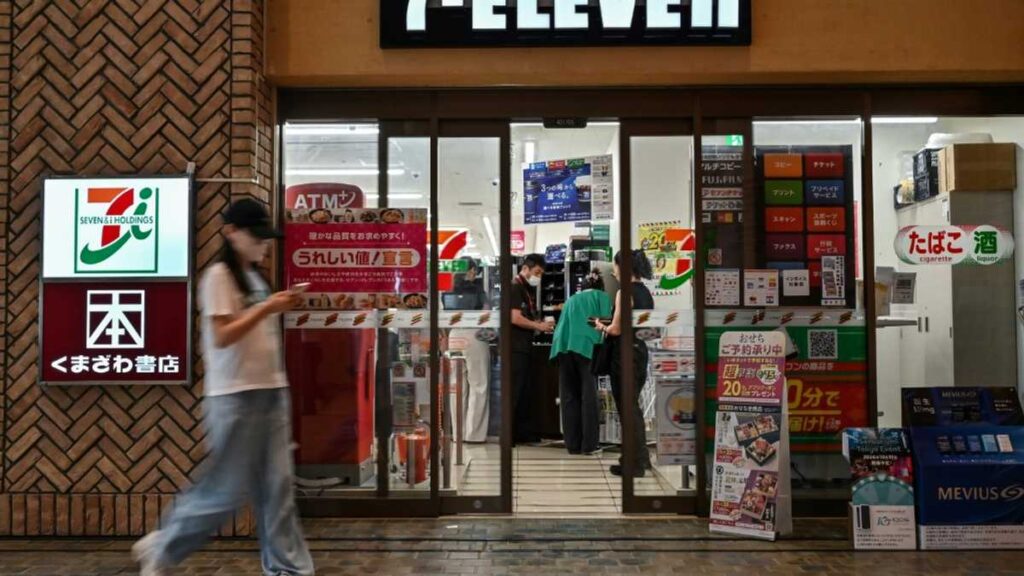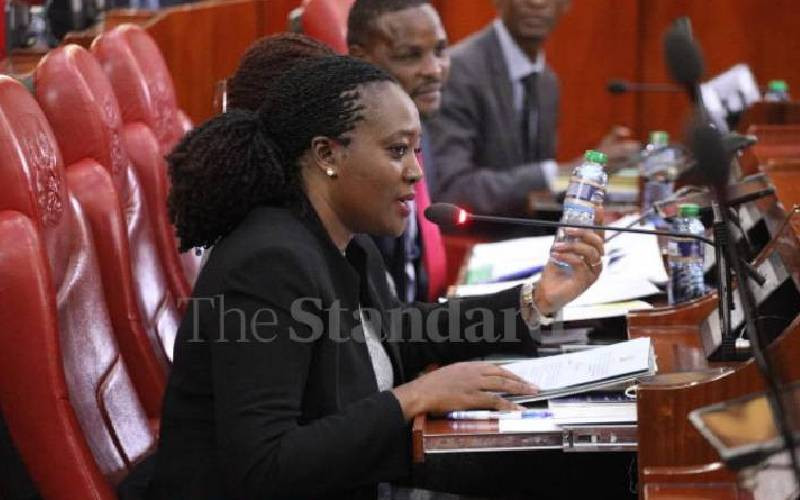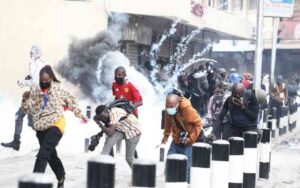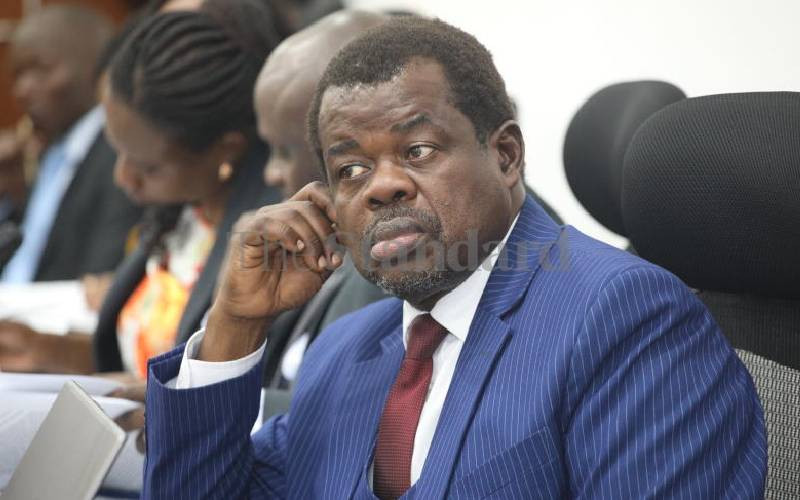Small caskets are the heaviest, they carry intense grief and shuttered dreams the parents had for the child.
On Tuesday, Susan Wanjira got to experience what no parent should: burying a child.
The burial came a day after Health Cabinet Secretary Aden Duale ordered an investigation into the death of five-month-old Gianna Wangari amid allegations of medical negligence at Kenyatta National Hospital (KNH).
On Monday as CS Aden Duale was addressing the media regarding the safety of patients at KNH a grieving mother, Susan Wanjira, seized the opportunity to air her grievances.
Wanjira had brought her one-year and five-month-old child, Gianna Wangari to KNH. The child had undergone abdominal surgery two months earlier and was recovering at home when her condition suddenly deteriorated.
“Her condition worsened on Friday July 18 at night, I gave her the medication we were given after the surgery. In the morning (Saturday)I brought her here. She was struggling to pass stool and vomit. The surgeon sent me to the pediatric ward saying that is not a surgical case. So I stayed at the wrong ward the whole time when it was a surgical case,” she says
Susan adds that the baby’s condition worsened and her biggest fear came true.
“When I sensed my child was in pain, I called the nurses but they told me the baby is okay. At 6am on Sunday (July 20), I carried my baby and took her to the nurses because she was in pain. My baby passed away in my arms,” she says
Before the Tuesday burial, Wanjira received the postmortem results.
“The results show that she had pneumonia and infection in the stomach. Earlier they told me she had kidney complications, so when I asked the postmortem expert he told me that the stomach infection was the cause of the complications,” said Wanjira
After Gianna died on July 20, Wanjira visited Kenyatta National Hospital, seeking justice for her child.
On Monday her lucky stars aligned when she addressed CS Duale.
The CS was holding a press conference that was meant to highlight the changes made when it comes to the safety of patients after the death of Edward Ndegwa and Gilbert Kinyua.
Duale promised to take action.
Stay informed. Subscribe to our newsletter
“Number one I am very sorry about it, no Kenyan should go through that, but I want you to make a full report to The Kenya Medical Practitioners and Dentists Council, KMPDC led by Dr David Kariuki,”
Since Dr Kariuki was not present, Duale asked Dr Rebecca to take Susan’s contacts.
“Make sure tomorrow morning (July 29) she goes to KMPDC and she files a complaint, and her case is investigated and I must be brought the file. You will get justice at least from us,” said Duale
However, Wanjira could not make it to KMPDC offices since it was the burial date. She is scheduled to go on Wednesday.
Wanjira explained to Duale that she does not remember the nurses who were there that night.
That is when Duale offered a solution that involved the Chief Executive Officer of KNH Dr. William Sigilai who was present during the press conference.
“Dr Sigilai make sure you parade all your nurses, who were on duty, she must get justice. We will investigate,” said Duale.
The Standard has learned that so far, Wanjira has recorded her statement with KMPDC and a file opened.
“Yersterday I went to Afya House where I was taken to KMPDC by a gentleman called Zeblon. I met Dr Kimutai then I wrote my statement and the case was opened. There is already a lawyer who has offered to represent me,” she told The Standard on phone.
Duale had gone to KNH to address the insecurity issues and the deaths of Edward Ndegwa and Gilbert Kinyua.
“What happened at KNH was unacceptable. It exposed system vulnerabilities that must be addressed with urgency, transparency, and resolve. I have directed all national referral hospitals to immediately conduct audits of their emergency systems, security protocols, patient monitoring, and operations, followed by concrete corrective action,” the CS said, adding, “referral hospitals have reported 443 long-stay and abandoned patients, 211 abandoned, and 232 discharged but unable to leave due to social or financial barriers.”
On negligence he added that accountability must go hand in hand with intention. Where negligence is found, action will be taken.
“We will no longer allow bureaucracy to shield failure. Hospitals must also partner with local law enforcement to assess and manage security risks, especially in high-risk areas. This is no longer optional,”
Other reforms Duale said include: Long-ignored systemic issues outdated protocols, staff shortages, and fragmented emergency response must be resolved. To ensure full compliance, he has established a Rapid Response Taskforce that will monitor implementation, and report directly to my office, and publish regular updates to the public.
Also, upgrading hospital infrastructure across the board expanding CCTV coverage, enforcing secure access to sensitive areas, standardizing emergency protocols, and ensuring all security personnel are alert and professionally trained.








